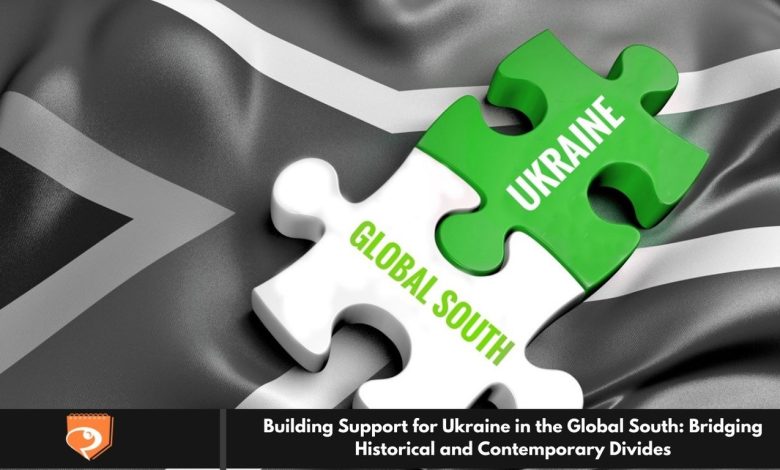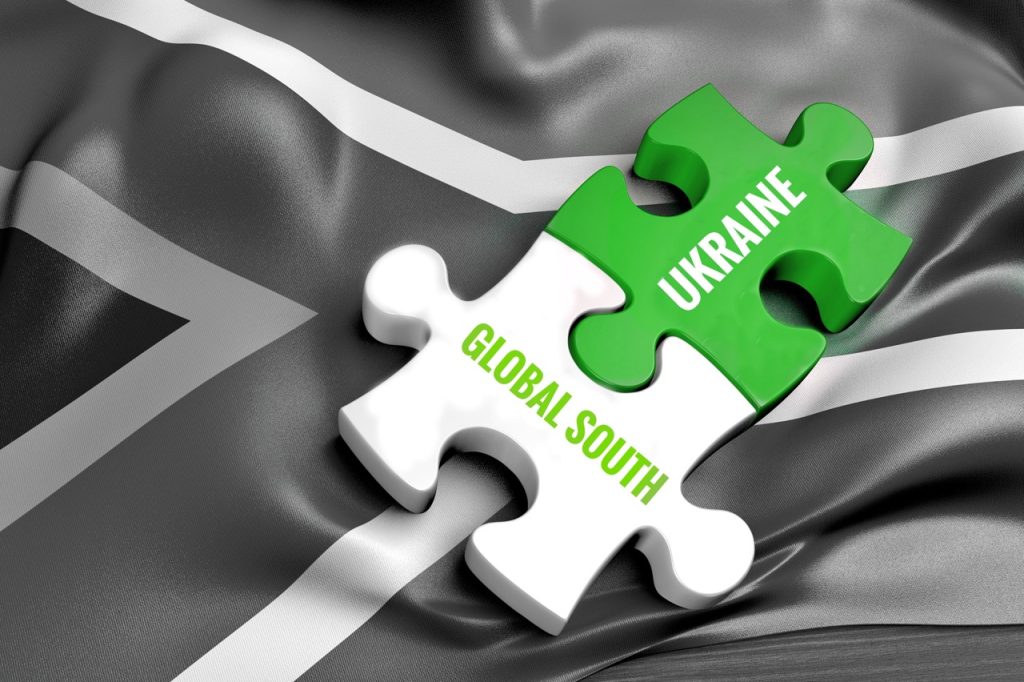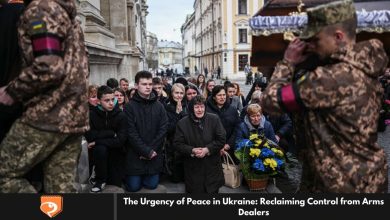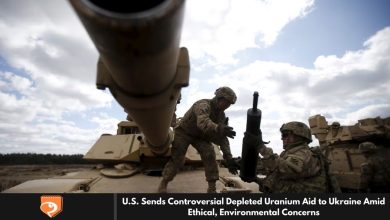Building Support for Ukraine in the Global South: Bridging Historical and Contemporary Divides

Ukraine’s struggle against Russian aggression has garnered significant international support, particularly from Europe and North America. However, this solidarity has not been mirrored in the Global South, where historical ties, differing priorities, and perceptions of global power dynamics have shaped varying responses. Understanding these nuances is vital for fostering global unity.

The historical legacies of colonialism and imperialism deeply influence the perspectives of many nations in the Global South. While Ukraine’s resistance is viewed as a fight for sovereignty and freedom in the West, it resonates less with nations that recall the Soviet Union’s role in anti-colonial movements. Bridging these historical narratives requires nuanced dialogue and mutual recognition of shared struggles.
This article explores the complexities of Ukraine’s relationship with the Global South, highlighting the challenges and opportunities for building alliances. By examining historical contexts, current geopolitical divides, and avenues for collaboration, it seeks to uncover pathways toward a more inclusive and cooperative international framework.
The Role of Affective Communities in Global Politics
Traumatic events often create affective communities that unite individuals across borders through shared feelings of suffering. The Russo-Ukrainian War exemplifies this phenomenon in Europe and North America. However, the Global South’s unique historical narratives hinder its inclusion in this transnational solidarity network.
Historical Ties: Soviet Legacy in the Global South
The Soviet Union’s support for anti-colonial movements in the Global South continues to influence perceptions of Russia as a successor state. South Africa, in particular, retains a positive memory of Soviet backing during its anti-apartheid struggle. This historical connection complicates efforts to garner support for Ukraine.
Challenges in Bridging Divides
Countries in the Global South, grappling with poverty and inequality, prioritize these issues over European conflicts. Furthermore, Ukraine’s alignment with NATO and Western powers amplifies perceptions of Western imperialism, complicating relationships with nations wary of historical colonial structures.
The Gaza Conflict: A New Dimension of Polarization
Recent global events, such as the Gaza conflict, have deepened divides. While Ukraine and its allies support Israel, many Global South nations express solidarity with Palestine, viewing the conflict through the lens of historical oppression. These contrasting stances further strain efforts to build alliances.
Decolonizing International Relations: A Shared Objective
Despite differences, Ukraine, Central and Eastern European (CEE) states, and the Global South share a desire to decolonize international relations. This mutual interest in asserting sovereignty and agency provides a foundation for dialogue and cooperation.
Leveraging Historical Traumas for Dialogue
Historical parallels between CEE countries and the Global South, such as forced labor and cultural persecution, offer opportunities for connection. Conferences like the “Intersections of Oppression” in Pretoria highlight the potential for shared narratives to foster mutual understanding.
Overcoming Challenges in Perception
Acknowledging the Global South’s unique experiences and perspectives is essential. Efforts to align Ukraine’s narrative with the Global South’s priorities—such as poverty alleviation and climate change—can build bridges. Recognizing the Global South’s agency in shaping international relations is equally vital.
Strategic Initiatives for Future Cooperation
Ukraine’s support for initiatives like South Africa’s UN Security Council bid illustrates the potential for meaningful collaboration. Strengthening ties through shared goals and respecting diverse interpretations of historical events can pave the way for a unified stance on global issues.
The Path Forward: Opportunities and Challenges
Building solidarity with the Global South requires patience, empathy, and strategic engagement. By addressing shared concerns and fostering mutual respect, Ukraine and CEE nations can create a more inclusive global coalition.
Bridging Historical Narratives
A critical step in fostering dialogue between the Global South and CEE states is recognizing shared historical struggles against oppression. Both regions have endured significant traumas, such as colonization and authoritarian regimes. Highlighting these parallels can create common ground and foster mutual understanding, paving the way for cooperative international relations.
Reframing Global Perceptions
CEE countries and Ukraine need to reframe perceptions by acknowledging the complex histories of the Global South. While NATO and Western alliances dominate their geopolitical narratives, showcasing empathy towards the Global South’s priorities, like economic inequality and climate change, can enhance diplomatic relationships and promote unified global strategies.
Promoting Decolonization Goals
Ukraine and its allies can champion decolonization in international relations as a shared objective with the Global South. Emphasizing sovereignty, agency, and respect for diverse perspectives can align the interests of peripheral states, creating a collective movement toward a fairer global order that benefits both regions.
Building Long-Term Partnerships
Engagement with the Global South must prioritize long-term commitments beyond immediate political needs. Collaborations on pressing global issues, such as poverty eradication and environmental sustainability, can solidify partnerships. Demonstrating genuine investment in these concerns helps build trust and positions CEE countries as reliable allies in international forums.
Frequently Asked Questions
Why is there limited support for Ukraine in the Global South?
Many countries in the Global South have historical ties to Russia or the Soviet Union, which supported anti-colonial movements. Additionally, differing priorities, such as economic inequality and climate change, shape their focus on global issues.
How has Russia’s historical influence impacted its perception in the Global South?
The Soviet Union’s support for anti-colonial struggles, like aiding South Africa’s fight against apartheid, fosters a positive memory of Russia as a successor state, influencing its current reception.
What are Ukraine’s challenges in engaging with the Global South?
Ukraine faces obstacles such as historical disinterest in the Global South’s struggles, alignment with Western powers, and the Global South’s skepticism of NATO and Western policies.
How does the Global South view NATO’s involvement in Ukraine?
NATO is often seen as a tool of Western imperialism, and some Global South nations perceive its support for Ukraine as an extension of US global dominance.
What steps has Ukraine taken to engage the Global South?
Ukraine has initiated dialogues, such as conferences on oppression, supported bids like South Africa’s UN Security Council membership, and explored diplomatic engagements with Latin American countries.
How does the Global South perceive the war in Ukraine?
While the Global South generally condemns acts of aggression, many nations emphasize neutrality or peaceful resolutions, reflecting a stance of non-alignment in global conflicts.
What role does the decolonization of international relations play in this context?
Decolonization emphasizes sovereignty, respect for diverse perspectives, and the agency of peripheral states. It provides common ground for collaboration between CEE nations like Ukraine and the Global South.
What are some shared historical experiences between CEE states and the Global South?
Both regions have faced oppression, such as forced labor and cultural persecution. However, mobilizing these shared experiences for current political needs has proven challenging.
How can Ukraine foster better relationships with the Global South?
Ukraine can prioritize addressing the Global South’s key concerns, such as poverty and climate change while promoting dialogue that acknowledges shared struggles and perspectives.
What future opportunities exist for collaboration between Ukraine and the Global South?
Building partnerships through shared goals like economic development, sustainability, and decolonization of global politics can strengthen ties and enhance mutual support in international relations.
Conclusion
Ukraine’s journey toward fostering support in the Global South underscores the complexity of international relations. By embracing dialogue, acknowledging shared histories, and addressing mutual priorities, Ukraine can lay the groundwork for enduring global solidarity against oppression and conflict.




